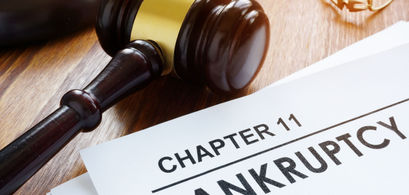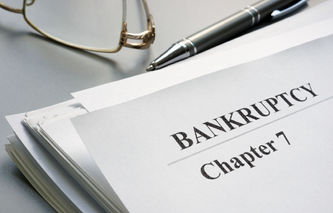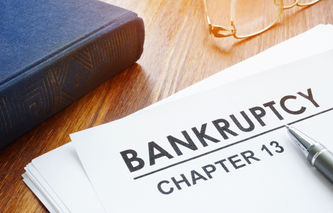When businesses and individuals are failing to meet their financial obligations, they have the ability to file for bankruptcy protection. Unlike Chapter 7, which involves the liquidation of assets, Chapter 11 allows the company to remain in control, while a court oversees the operation of that business. In this article, we're going to cover the topic of Chapter 11 bankruptcy, sometimes referred to as "reorganization" or "debtor in possession." As part of that coverage, we're going to examine some of the rules of the process. We'll also explain the eligibility requirements, as well as the advantages and disadvantages of filing under Chapter 11. Finally, we'll talk about the role of the U.S. Trustee or Bankruptcy Administrator, and the discharge of debt.
Chapter 11 Bankruptcy Process
Businesses that are having trouble meeting their financial obligations, and wish to seek protection from creditors, have two options:
Chapter 7 Bankruptcy: also referred to as "liquidation," this process involves the termination of the business and sale of all assets.
Chapter 11 Bankruptcy: also referred to as "reorganization," this process permits debtors to propose a plan that allows them to remain in control of their business while they offer a remedy to creditors.
Eligibility Rules
The eligibility rules for a business wishing to seek Chapter 11 protection are straightforward:
The debtor can be an individual, partnership, corporation, or any other business entity.
The debtor must file a schedule of assets and liabilities, current income, current expenses, a schedule of contracts and leases, as well as a statement of financial affairs.
If the debtor failed to appear in court, comply with court orders, or had a prior bankruptcy filing dismissed during the preceding 180 days, then the debtor cannot file for bankruptcy.
Finally, any individual attempting to file under Chapter 11 protection must have received credit counseling from an approved agency during the preceding 180 days.
Debtor-in-Possession
Businesses that file for Chapter 11 protections assume the role of debtor-in-possession. In this role, the business must account for property, examine claims by creditors, and file reports requested by the court. The business also has the right to seek the help of attorneys and accountants to assist in the preparation of the reorganization proposal.
Chapter 11 Bankruptcy: Permits debtors to propose a plan that allows them to remain in control of their business while they offer a remedy to creditors,Moneyzine Editor
The debtor-in-possession has a fiduciary role to operate with the highest standards in order to protect the interests of both the operating company as well as creditors.
U.S. Trustee / Bankruptcy Administrator
Each Chapter 11 case is assigned a U.S. Trustee or Bankruptcy Administrator to oversee the operation of the debtor-in-possession / business. The trustee is also responsible for evaluating reports supplied by the debtor. These reports typically contain information concerning the financial health of the business such as monthly income, operating expenses, and current assets. The trustee will establish a meeting between the creditors and debtor. During this meeting, creditors hold discussions with other creditors, and may question the debtor under oath about the company's financial affairs.
Automatic Stay
Bankruptcy petitions filed under this chapter invoke an "automatic stay" that requires all creditors of the business to stop all collections activities. If the creditors can convince the U.S. Trustee and court that it is in their best interest to convert the Chapter 11 filing to a Chapter 7 case, then liquidation of the business will occur. Liquidation can also be proposed as part of a Chapter 11 case if management believes value can be created by breaking up existing business divisions. Under certain conditions, a creditor of a secured asset may be granted the right to foreclose on a property, sell it, and then apply the money received to pay down debt. This can happen when the debtor has no equity in the property, and that same property is not required to achieve an effective reorganization.
Proof of Claims
Creditors whose claim is not scheduled must file a proof of claim document that provides evidence of a claim against the debtor. Creditors appearing on the debtor's schedule are believed to be both valid, and the claim is considered quantifiable. By filing a proof of claim, the creditor is allowed to vote on the debtor's reorganization plan. Filing a claim also allows the creditor to participate in any monetary distribution resulting from a successful reorganization plan.
Reorganization Plan
The debtor can file a reorganization plan up to 120 days after filing for bankruptcy. Courts can grant the debtor the ability to delay filing their plan for up to 18 months. Acceptance of the plan typically occurs within 180 days after filing of the petition. Once again, the acceptance of the plan can be delayed for up to 20 months by the court. If the debtor fails to file and obtain acceptance of a plan, then creditors can file a plan on behalf of the debtor. The court can confirm the reorganization plan if three requirements are satisfied:
The plan must be deemed feasible. That is to say, the plan will not result in liquidation unless a liquidation plan is proposed.
The plan must be proposed in good faith.
The plan must comply with all provisions of the Bankruptcy Code.
As mentioned earlier, Chapter 11 cases can involve the liquidation of assets when management believes value can be created by this process. In fact, Chapter 11 provides business owners more flexibility than Chapter 7 when liquidating assets.
Pros and Cons
One of the advantages of Chapter 11 is it allows a business to continue to operate while the management team develops a plan to restructure the company's debt. It also protects employees and other stakeholders from liquidation, and forces a company to revaluate the economics of its operating plan and financial condition. Critics of Chapter 11 believe the provision provides unskilled managers an unwarranted escape route from liquidation. Since the existing management team is often involved in the development of the reorganization plan, that same team of substandard employees is often left intact in the reorganization plan. Another problem with Chapter 11 is it provides the business with an unfair competitive advantage in the marketplace, often distorting the economics within an industry. Finally, by allowing companies to file for protection from creditors, the value of collateral is weakened, and the risk associated with secured loans increases.
Discharge of Debt
In general, when a reorganization plan is confirmed, all of the debt incurred before the confirmation date is discharged. The debtor is then required to make all of the repayments outlined in the reorganization plan. In other words, the reorganization plan itself creates a new contractual relationship between the debtor and its creditors. There are exceptions to this generalization. For example, confirmation does not allow for the discharge of debt if the reorganization plan is a liquidation plan. In addition, if an individual files for Chapter 11 bankruptcy, then discharge is not finalized until all payments are made to creditors.



